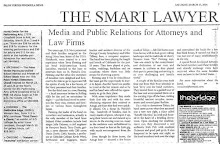Ten simple tips for handling media calls.
1) Decide whether it is in your best interest to participate in the story. It almost always is in your interest as long as you have a plan. At the very least you can make contact to establish or confirm your relationship with the journalist and offer to help next time.
2) Call the journalist back. Always. Even if you are going to decline to participate. Make contact.
3) Call back soon. As attorneys we flatter ourselves as living in a world of harsh deadlines. Media deadlines are harsher. Reporters usually only have a few hours to find you and get their story. That means you have to respond the same day you receive their call. Sometimes a hard-pressed journalist will call you 20 minutes before deadline.
4) Prepare. Make a list of between three and five "talking points" you want to get into the story. Short items. Write them down. Vow to repeat each one during the call.
5) Identify yourself and ask the reporter to identify themselves and their media outlet. Ask what the story is about. Listen to the answers and write them down. But don't believe the journalist's summary of the story is totally accurate --a journalist might be cagey about a story's angle or might change the focus of a story depending on what they learn from talking to you.
6) Stay in control. Be polite, be professional, do not chat or gossip or assume your charm and wit will keep the reporter from using the information you are conveying. The reporter is not your buddy. Talking to a reporter on the phone is very similar to making a statement in court on the record. Do not let the journalist catch you off guard.
7) Everything is on the record. Everything. Unless you have a long-term personal relationship with this journalist and a very clear cut and tested set of rules regarding what is "on the record" or "for background" assume anything you say could end up in the story. That includes the over-the-shoulder conversation you are having with your secretary about the call.
8) Politely fail to answer questions not in your best interest. NEVER say "no comment" or anything equally foolish and rude. Gently change the subject back to your talking points. As an attorney you are a professional communicator. Reporters are often intimidated when interviewing attorneys because of our communications skills. Use those skills.
9) Repeat your talking points. Work them into the conversation. Don't read them from the list. Your talking points are like the evidence you want to get in front of the jury. Slide them into your sentences. Repeat them. Do it with subtlety and tact if possible, otherwise if necessary, but do it.
10) In case of disaster, bail out. I have conducted thousands of interviews with attorneys, and been interviewed hundreds of times. I have a good nose for it. But I've been fooled and you might be too. If you find yourself ambushed and having an unpleasant conversation with an angry ideologue armed with an ax to grind then get off the phone. Politely note you may have to agree to disagree, thank them and excuse yourself for an important meeting. You have no obligation to talk to a reporter. Ever.
Your reputation is your most valuable asset
Subscribe to:
Post Comments (Atom)







No comments:
Post a Comment